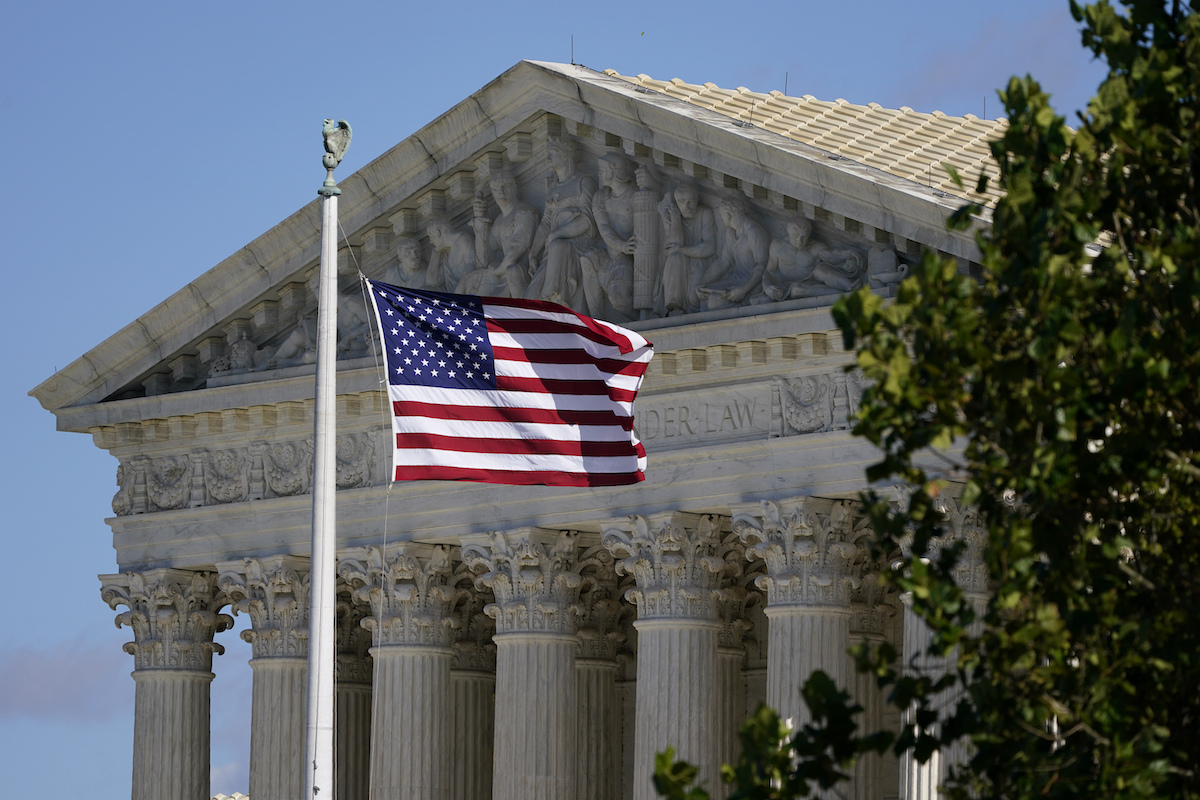

An American flag blows in the wind in front of the Supreme Court building on Capitol Hill in Washington, November 2, 2020. (AP Photo/Patrick Semansky)
A petition filed in April by American Samoans asks the Supreme Court to overturn a set of century-old rulings used to deny equal rights and federal benefits to the residents of American Samoa, Puerto Rico, Guam, and other U.S. territories.
The rulings, known as the Insular Cases, date back to 1901, and the earliest cases were decided by the same Supreme Court that legalized racial segregation in Plessy v. Ferguson. The court’s decisions hinged on the difference between incorporated and unincorporated territories, with those residing in the latter being viewed as “alien races” that were “absolutely unfit to receive” full constitutional protections.
For the past century, these decisions have prohibited U.S. territories like Puerto Rico and Guam from receiving full Constitutional protections and benefits. The petition, filed by John Fitisemanu last April, asks the justices to settle “whether the Insular Cases should be overruled.”
Fitisemanu was born in American Samoa and now lives in Utah where he was denied the right to vote due to the fact that American Samoans are classified not as U.S. citizens but as U.S. nationals—in other words, second-class citizens. His U.S. passport makes this distinction clear on the last page: “THE BEARER IS A UNITED STATES NATIONAL AND NOT A UNITED STATES CITIZEN.”
Fitisemanu, two other Utah residents born in American Samoa, and the Southern Pacific Islander Coalition are defending their entitlement to birthright citizenship under the Fourteenth Amendment’s Citizenship Clause, which states that those born “in the United States, and subject to the jurisdiction thereof, are citizens of the United States.”
The Supreme Court has previously ruled and reaffirmed that unincorporated territories, like American Samoa and Puerto Rico, are not technically in the United States but are owned by it and therefore under its jurisdiction.
Before Fitisemanu and the others filed their petition to the Supreme Court, U.S. District Judge Clark Waddoups ruled in their favor in 2019. But in June 2021, the Tenth Circuit reversed the lower court’s ruling relying on the Insular Cases as legal precedent, even though the judges recognized the racist purpose of the Insular Cases and their reasoning as “disreputable to modern eyes.”
“Even though federal courts criticize the Insular Cases, they still use them because it’s still good law, and they use them to deny benefits and entitlements to residents of the territories,” Lía Fiol-Matta, senior counsel at LatinoJustice PRLDEF, told Latino Rebels.
In April, just six days before Fitisemanu filed his petition, the Supreme Court used the Insular Cases as legal precedent to make U.S. citizens living in Puerto Rico ineligible for the Supplemental Security Income program, which provides benefits to older, disabled, and blind Americans. In United States v. Vaello Madero, the Supreme Court ruled 8-1, with Justice Sonia Sotomayor, the court’s first and only Puerto Rican judge, as the sole dissenter.
“It’s a very disappointing result, although perhaps not surprising,” said Neil Weare, president and founder of Equally American. “What was surprising was that you had justices from opposite ends of the political spectrum both agreeing on the Insular Cases issue.”
Despite concurring with the majority, Justice Neil Gorsuch joined Justice Sotomayor in denouncing the decisions made by the Insular Cases.
“It is past time to acknowledge the gravity of this error and admit what we know to be true: The Insular Cases have no foundation in the Constitution and rest instead on racial stereotypes. They deserve no place in our law,” Justice Gorsuch wrote.
In his 10-page concurring opinion, Justice Gorsuch called on his colleagues to overrule the “shameful” Insular Cases in “an appropriate case.” Civil rights groups, including the American Civil Rights Union, Latino Justice PRLDEF, and Equally American, are hopeful the petition filed by Fitisemanu could be the case Justice Gorsuch is looking for—he cited the decision in Fitisemanu v. United States three times in his opinion.
While the petitioners wait for the Supreme Court to accept or reject the case, eight amicus briefs supporting the overturning of the Insular Cases have been filed from both Republicans and Democrats, conservatives and liberals.
Adriel I. Cepeda Derieux, a senior staff attorney and voting rights lawyer at the American Civil Rights Union who recently described the Insular Cases as “racist,” was not surprised to see people from differing political or ideological backgrounds agreeing with each other.
“It gives me hope because it means that we’ve reached a point where everyone can agree on this point, which is that cases premised on the racial inferiority of people who live in these territories have no business being in our laws and in our case books that lawyers study,” Derieux told Latino Rebels.
The government is set to respond to the Fitisemanu petition by the end of June.
***
Chantal Vaca is a summer correspondent for Futuro Media based in New York City and is a graduate of the Columbia University School of Journalism. Twitter: @VacaChantal


